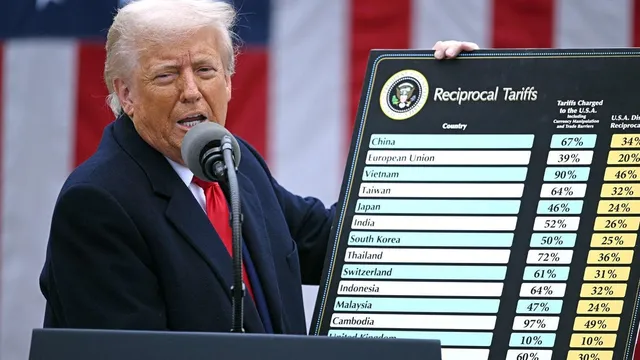
Tariff implementation devastates Swiss watch market in the U.S
2025-04-09 00:00- On April 9th, the U.S. implemented a 31% tariff on Swiss watch imports, impacting both manufacturers and retailers.
- Swiss watch exports have declined by 2.4%, with significant drops reported by major companies in the industry.
- The situation has led to a reassessment of pricing strategies and a challenging outlook for the luxury watch market.
Express your sentiment!
Insights
On April 9th, 2025, the United States imposed a significant 31% tariff on Swiss watch imports, aiming to protect domestic businesses while impacting foreign manufacturers and retailers. This decision comes at a time when the Swiss watch industry is already grappling with challenges, as exports have shown a decline of 2.4% in the first two months of the year. With the U.S. being the largest market for Swiss watches, this tariff is affecting manufacturers like LVMH Group, Swatch Group, and Richemont Group, all of which have reported substantial declines in YTD figures. Publicly traded retailers, such as Watches of Switzerland Group, have experienced an alarming 42% drop in sales. The new tariff rates have forced the industry—including manufacturers, U.S. distributors, and retailers—to seek ways to mitigate their effects, such as adjusting pricing strategies. Notably, Mike France, Co-Founder of Christopher Ward, announced plans to absorb tariff costs by altering pricing mechanisms or storing watches in Europe until the tariffs are lifted. Industry insiders face a challenging situation as they consider the long-term implications of these tariffs on consumer behavior and profit margins. Overall, the sentiment from both manufacturers and consumers reflects a bleak outlook for future business in the luxury watch market amidst these tariff increases. The situation underscores a precarious balance between market protectionism and international trade dynamics, where even casual consumers wonder how tariffs will impact their luxury purchases.
Contexts
The Swiss watch industry has long been an emblem of luxury, quality, and precision. The impact of tariffs on this industry has been significant, affecting the import and export dynamics of Swiss watches on a global scale. Tariffs can alter market prices, and consequently, the competitiveness of Swiss watches in foreign markets. With the imposition of higher tariffs on luxury goods, especially in key markets such as the United States and China, the Swiss watch manufacturers are faced with increased costs that could potentially harm their market share. The financial burden created by these tariffs may force Swiss manufacturers to either increase prices to maintain profit margins or absorb the costs, which could lead to reduced profitability and investment in innovation and marketing efforts. In recent years, trade tensions and tariff disputes between major economies have created uncertainty for the Swiss watch sector. These tariffs can lead to retaliatory measures, further complicating trade agreements and diminishing the appeal of Swiss watches in international markets. For instance, a rise in tariffs may lead to decreased demand from consumers who perceive these luxury items as too expensive. Consequently, brands must explore alternative strategies, such as enhancing their value proposition through branding or seeking new markets less impacted by tariffs, in order to counteract potential losses. The industry's reliance on specific markets necessitates a careful analysis of which regions can maintain competitiveness despite trade barriers. Furthermore, the shift in consumer preferences towards smart watches and wearable technology reflects changing trends in the watch market. The imposition of tariffs could restrict the ability of traditional Swiss watchmakers to adapt quickly to these emerging trends, as their significant resources might be diverted towards managing tariff impacts instead of product innovation. Moreover, the increasing competition from non-Swiss watch manufacturers also poses a challenge, as these brands can exploit the advantageous pricing created by avoiding high tariffs. The capacity of Swiss watch brands to sustain their legacy relies on their ability to adapt amid these economic pressures while maintaining their core values of craftsmanship. In conclusion, the interplay of tariffs and the Swiss watch industry has profound implications for business strategy and the future of Swiss watchmaking. As manufacturers navigate the complex landscape of international trade, it is essential for them to remain proactive in understanding the effects of tariffs on their pricing structures, market position, and consumer behavior, while also seeking opportunities to innovate. Ultimately, the ability to maintain competitive advantage in a changing economic environment will define the future success of the Swiss watch industry.